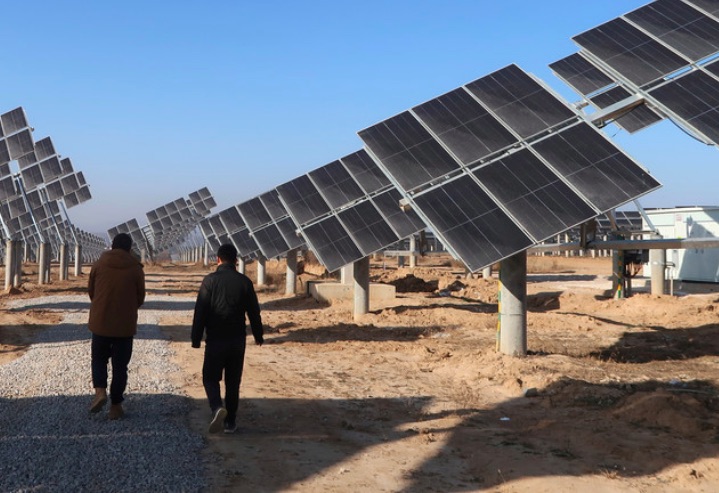. . SUSTAINABLE DEVELOPMENT . .
An article from the World Economic Forum (reprinted according to terms of Creative Commons Attribution-NonCommercial-NoDerivs 4.0 Unported License “CCPL”)
The COVID-19 coronavirus has forced entire countries into lockdown mode, terrified citizens around the world, and triggered a financial-market meltdown. The pandemic demands a forceful, immediate response. But in managing the crisis, governments also must look to the long term. One prominent policy blueprint with a deep time horizon is the European Commission’s European Green Deal, which offers several ways to support the communities and businesses most at risk from the current crisis.

The COVID-19 pandemic has demonstrated that human societies are capable of transforming themselves more or less overnight.
Image: REUTERS/Muyu Xu
COVID-19 reflects a broader trend: more planetary crises are coming. If we muddle through each new crisis while maintaining the same economic model that got us here, future shocks will eventually exceed the capacity of governments, financial institutions, and corporate crisis managers to respond. Indeed, the “coronacrisis” has already done so.
The Club of Rome issued a similar warning in its famous 1972 report, The Limits to Growth, and again in Beyond the Limits, a 1992 book by the lead author of that earlier report, Donella Meadows. As Meadows warned back then, humanity’s future will be defined not by a single emergency but by many separate yet related crises stemming from our failure to live sustainably. By using the Earth’s resources faster than they can be restored, and by releasing wastes and pollutants faster than they can be absorbed, we have long been setting ourselves up for disaster.
On one planet, all species, countries, and geopolitical issues are ultimately interconnected. We are witnessing how the outbreak of a novel coronavirus in China can wreak havoc on the entire world. Like COVID-19, climate change, biodiversity loss, and financial collapses do not observe national or even physical borders. These problems can be managed only through collective action that starts long before they become full-blown crises.
The coronavirus pandemic is a wake-up call to stop exceeding the planet’s limits. After all, deforestation, biodiversity loss, and climate change all make pandemics more likely. Deforestation drives wild animals closer to human populations, increasing the likelihood that zoonotic viruses like SARS-CoV-2 will make the cross-species leap. Likewise, the Intergovernmental Panel on Climate Change warns that global warming will likely accelerate the emergence of new viruses.
(article continued in right column)
Despite the vested interests of companies and governments, Can we make progress toward sustainable development?
How can we work together to overcome this medical and economic crisis?
(Article continued from the left column)
Governments that succeed in containing epidemics all tacitly follow the same mantra: “Follow the science and prepare for the future.” But we can do much better. Rather than simply reacting to disasters, we can use the science to design economies that will mitigate the threats of climate change, biodiversity loss, and pandemics. We must start investing in what matters, by laying the foundation for a green, circular economy that is anchored in nature-based solutions and geared toward the public good.
The COVID-19 crisis shows us that it is possible to make transformational changes overnight. We have suddenly entered a different world with a different economy. Governments are rushing to protect their citizens medically and economically in the short term. But there is also a strong business case for using this crisis to usher in global systemic change.
For example, there is no good reason not to be phasing out fossil fuels and deploying renewable energy technologies, most of which are now globally available and already cheaper than fossil fuels in many cases. With the recent oil-price plunge, perverse fossil-fuel subsidies can and should be eliminated, as the G7 and many European countries have pledged to do by 2025.
Shifting from industrial to regenerative agriculture also is immediately feasible, and would allow us to sequester carbon in the soil at a rate that is sufficient to reverse the climate crisis. Moreover, doing so would turn a profit, enhance economic and environmental resilience, create jobs, and improve wellbeing in both rural and urban communities.
Regenerative agriculture features prominently in many of the new economic models that are now being explored by city governments around the world – all of which are based on the principle of living within our planetary boundaries. As one of us (Raworth) argues in advancing her idea of “Doughnut Economics,” the goal should be to create a “safe and just operating space for all of humanity.” In other words, we must work within the planet’s natural limits (the outer boundary of the doughnut) while also ensuring that marginalized communities do not fall behind (into the doughnut hole).
For policymakers responding to the current crisis, the goal should be to support citizens’ livelihoods by investing in renewable energy instead of fossil fuels. Now is the time to start redirecting the $5.2 trillion spent on fossil-fuel subsidies every year toward green infrastructure, reforestation, and investments in a more circular, shared, regenerative, low-carbon economy.
Humans are resilient and entrepreneurial. We are perfectly capable of beginning again. If we learn from our failings, we can build a brighter future than the one that is currently in store for us. Let us embrace this moment of upheaval as an opportunity to start investing in resilience, shared prosperity, wellbeing, and planetary health. We have long since exceeded our natural limits; it is time to try something new.
* * * * * * *
(Editor’s note: For a more pessimistic view, see Unfortunately, Coronavirus Is Bad News For Ecology In The Long Term.)